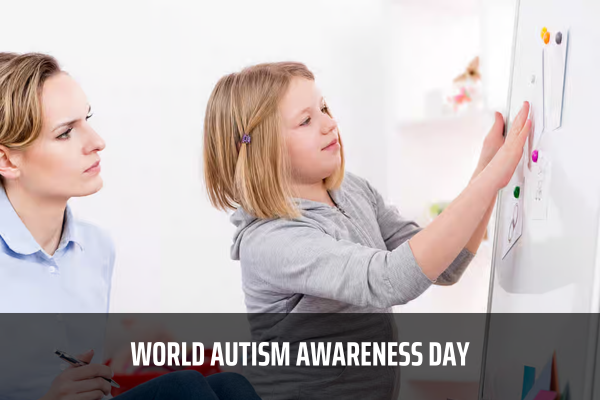Vietnam: What is April 2? Why is there a World Autism Awareness Day? Are autistic children considered disabled?
What is April 2? Why is there a World Autism Awareness Day?
On December 18, 2007, the United Nations General Assembly adopted Resolution A/RES/62/139, designating April 2nd of each year (starting from 2008) as World Autism Awareness Day (WAAD). This day aims to encourage member states to take action to raise awareness about individuals with autism spectrum disorder (ASD) and promote research to find new methods to improve the health and integration abilities of those affected by this condition.
According to the latest research in March 2022 by the World Health Organization (WHO), it is estimated that globally, 1 in every 100 children has ASD. Autism is a neurodevelopmental disorder that impairs communication skills, speech, and the development of social relationships. Additionally, children with autism face difficulties in behavior, interests, rigid habits, and patterns. They encounter challenges in integrating with the world around them.
Autism is a disorder, not a disease, and it is not contagious from one person to another. Therefore, understanding autism correctly helps us detect and intervene early, preventing the child from missing the "Golden Time" - the period before the age of 3 when interventions are most effective. This understanding also helps reduce stigma and pressure on the child and their family, thus improving their quality of life.
April 2 is chosen by the United Nations as World Autism Awareness Day to call for increased community attention and understanding of this disorder, helping children with autism to be identified, treated, loved, and easily integrated into society.
Note: The above content is for reference only.

Vietnam: What is April 2? Why is there a World Autism Awareness Day? Are autistic children considered disabled? (Image from the Internet)
Vietnam: Are autistic children considered disabled?
Pursuant to Clause 1, Article 2 of the Law on Persons with Disabilities 2010 stipulates as follows:
Interpretation of terms
In this Law, the terms below are construed as follows:
1. Person with disabilities means a person who is impaired in one or more body parts or suffers functional decline manifested in the form of disability which causes difficulties lo his/her work, daily life and study.
2. Stigma against persons with disabilities means the attitude of disregarding or disrespecting persons with disabilities because of their impairments.
3. Discrimination against persons with disabilities means the act of shunning, refusing, maltreating, disparaging, showing prejudice against, or restricting the rights of, persons with disabilities because of their impairments.
...
At the same time, pursuant to Clause 1, Article 3 of the Law on Persons with Disabilities 2010, the types and levels of disabilities are stipulated as follows:
Forms and degrees of disability
1. Forms of disability include:
a/ Physical disability;
b/ Sensory disability;
c/ Visual disability;
d/ Mental and psychiatric disability;
e/ Intellectual disability;
f/ Other disabilities.
...
In addition, Clause 4, Article 2 of Decree 28/2012/ND-CP stipulates the following types of impairment in Vietnam:
Types of impairment
1. Mobility impairment means partial or total loss of the mobility of the head, the neck, the lower or upper limbs, or the body, that restricts the dexterity.
2. Hearing and speaking impairment means partial or total loss of the hearing or speaking function or both hearing and speaking functions; or the function to pronounce words and sentences clearly, leading to limited communication or information exchange in words.
3. Visual impairment means partial or total loss of sight and senses of light, colors, images and objects in normal light and environment.
4. Mental impairment means disorder of senses, memory, feeling, thought and act control manifested abnormal speech or acts.
5. Intellectual impairment means partial or total loss of perception and mind manifested in the slowness or inability to think, to analyze objects, phenomena or to solve problems.
...
Therefore, based on the above regulations, it can be understood that children with autism are considered to have disabilities in terms of mental and psychiatric disability.
Vietnam: How many levels of impairment are there?
Pursuant to the provisions of Clause 1, Article 2 of the Law on Persons with Disabilities 2010, person with disabilities means a person who is impaired in one or more body parts or suffers functional decline manifested in the form of disability which causes difficulties lo his/her work, daily life and study.
Pursuant to the provisions of Article 3 of Decree 28/2012/ND-CP, there are 3 levels of impairment in Vietnam as follows:
Level 1: People suffering from particularly serious impairments are those whose impairments lead to total loss of their functions, self-control or make them unable to move, to dress, to keep personal hygiene and to complete other everyday tasks without other people to watch, to help and to take care of.
Level 2: People suffering from serious impairments are those whose impairments lead to partial loss or deficiency of their functions, self-control or make them unable to move, to dress, to keep personal hygiene and to complete other everyday tasks without other people to watch, to help and to take care of.
Level 3: People suffering from mild impairments are the disabled not falling into 02 cases mentioned above.
LawNet